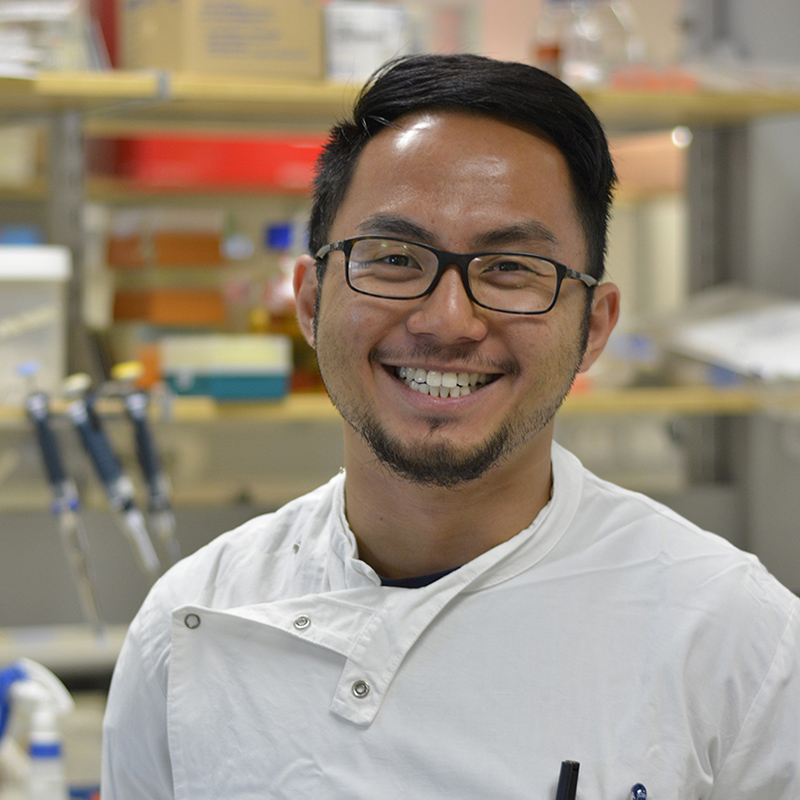Dr Kaiwen Chen has made an impressive impact on his research field in just a few years since completing his PhD at the IMB.
His discoveries are changing what we know about cell death and inflammation and he now leads his own team in the Life Sciences Institute at the National University of Singapore, investigating the mechanisms of cell death and innate immune signalling.
He’s also a newly elected Editorial Board member for Communications Biology.
Kaiwen’s group is interested in understanding the complex crosstalk between innate immune signalling and cell death, aiming to rewire cell signalling pathways and develop new therapies for patients with infectious diseases and inflammatory disorders.
It’s an ambitious goal, but Kaiwen has always been a high achiever and team player who pushes his own boundaries.
Moving from Singapore to Brisbane as an International student, Kaiwen graduated with a Bachelor of Science with First Class Honours in 2010, receiving several commendations from the UQ Dean of Science. With a long-term interest in the host side of infection and immunity, he completed his PhD under the supervision of Professor Kate Schroder.
Kaiwen won competitive scholarships from the IMB and the ANZ Bank Trustee to support his seminal research. During his doctorate studies, Kaiwen achieved four first-author publications, including two original research articles, a review, and a book chapter. He was involved in a further two original research articles and an additional review.
While at the IMB, Kaiwen wrote the “Chemical, Biological, and Clinical Aspects” chapter for the textbook Cancer and Inflammation Mechanisms. This new perspective on the link between inflammation and cancer inflammation was paradigm-changing and directly impacted inflammation research and the associated clinical outcomes.
Kaiwen remained in Professor Schroder’s laboratory as a postdoctoral researcher for two years before securing a position in Professor Petr Broz’s laboratory at the University of Lausanne, supported by two prestigious fellowships.
While there, Kaiwen made a breakthrough discovery that proved a molecule called Gasdermin-D (GSDMD) was the key driver of inflammation associated with the pharmacological activation of cell death, such as during chemotherapy.
Discovering the role of GSDMD has led to further research and an attempt to block the GSDMD protein with oral inhibitors to treat inflammatory diseases. While success is elusive so far, the knowledge gained will progress the push towards positive patient outcomes.
At the University of Lausanne, Kaiwen’s leadership capabilities came to the fore, both as a team captain and as a role model for emerging career scientists.
His desire to achieve the best outcomes for his team was evident soon after starting work in Switzerland. The laboratory had recently relocated and was without appropriate resources. Kaiwen stepped in and created protocols to support diverse laboratory functions and trained his colleagues in best practices for optimising laboratory infrastructure.
Kaiwen also supervised and mentored many postgraduate students during his time in Professor Broz’s laboratory. His commitment to collaborative work and paying it forward means he is in demand as a PhD supervisor. He is known for going beyond just bench skills and also teaching his students how to analyse and evaluate their data ready for publication.
This nurturing of critical and independent thinking means Kaiwen’s students finish their PhDs with the capability to bring a project from preliminary data to a finished manuscript for submission.
Kaiwen himself has authored 31 highly cited publications and is invited to peer review papers for prestigious journals, including Molecular Cell, PNAS USA, Cell Reports, PLOS Pathogens, and EMBO Reports.
Following this outstanding work during his PhD and his equally impressive postdoctoral work in Switzerland, Kaiwen has returned to the National University of Singapore as an Assistant Professor.
Drive lifesaving discoveries with us

Dr Kaiwen Chen
IMB
PhD student 2011 – 2015
Postdoctoral Researcher, Inflammasome Lab, 2016 - 2017
Now
Team Leader and Assistant Professor, Life Sciences Institute at the National University of Singapore
